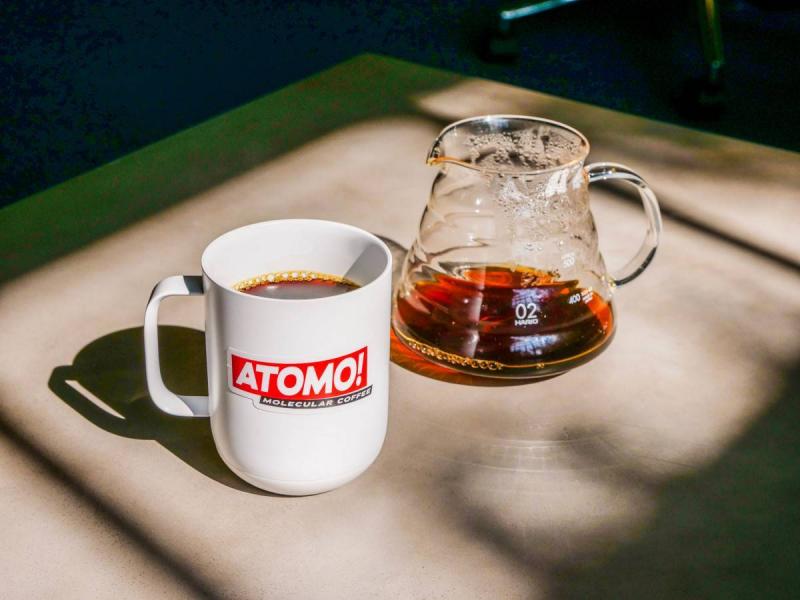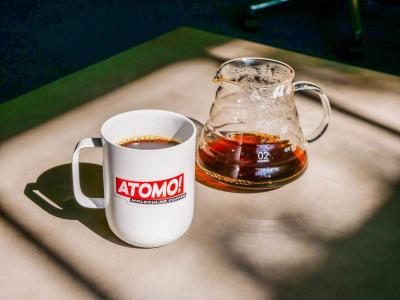In a location just a block away from a Starbucks café on Seattle's bustling West Avenue, a woman stands in front of a coffee grinder, while a kettle full of dark brew bubbles on a nearby heater. The whole space is filled with the fragrant aroma of freshly roasted coffee. This scene might seem ordinary, were it not for some notable details. Firstly, the woman is wearing a lab coat. Secondly, a glass flask operates with steam instead of a cup. And thirdly, perhaps the strangest aspect, is that not a single coffee bean has been used to make this coffee.
In reality, we are talking about the office of Atomo Coffee Inc., a food technology startup led by friends and co-founders Andy Kleitch and Garrett Stouffer. The team of food scientists and chemists is hopeful of producing components for meat alternatives, egg substitutes, and ultimately, milk alternatives. Of course, there is also Atomo's coffee, which is, in fact, coffee-free, as it is made from recycled ingredients like sunflower seed husks and watermelon seeds, subjected to a patented chemical process to produce molecules that mimic the taste and feel of real coffee. The resulting coffee is prepared just like any regular cup of coffee.
And before you ask, yes, this coffee contains caffeine.
### Environmental Challenges of the Coffee Industry
The $100 billion coffee industry is one of the most vulnerable to climate change in the world. Arabica coffee, the most common variety preferred by coffee lovers and major chains like Starbucks, thrives in cool areas characterized by rainy and dry seasons. However, global warming is causing these regions to shrink.
According to a 2019 report from scientists at the Royal Botanic Gardens, Kew in the UK, these plants could lose at least 50% of their habitat over the next seven decades. As temperatures continue to rise, farmers are relocating their farms in search of cooler temperatures, leading to increased deforestation. This threat has propelled Kleitch and Stouffer's efforts in this field.
After more than two years of development, they will finally launch their coffee for sale this year in ready-to-drink cans. They plan to eventually expand into home-use coffee and whole beans, which is part of the company's model. Stouffer, who has spent the past two decades in food science and development, stated, "We like to think of ourselves as the 'Tesla of the coffee world'." Kleitch is a serial entrepreneur who previously worked at Amazon as a product manager.
Stouffer added, "Before Tesla, you had no option if you wanted a luxury, high-performance car that didn’t use diesel and gasoline. The same goes for Atomo; you had no good coffee options not linked to deforestation. But today, you have that."
There’s no requirement limiting coffee products to those sourced from a specific origin, which will work in favor of Atomo's coffee, which is bean-free.
### Growth of Plant-Based Foods
While there are many certifications available to prove that products come from sustainable sources, the lack of a unified standard with transparent measures opens the door to potential fraud by producers and distrust among consumers. However, experienced investors supporting plant-based food technology bet that Atomo can bridge this gap.
The company has successfully raised approximately $11.5 million in two funding rounds since its launch in 2019, when it started with a $25,000 campaign. Supporters of the company include Horizons Ventures in Hong Kong, which has also invested in Impossible Foods, and S2G Ventures, which includes Beyond Meat.
### Fierce Competition
Plant-based foods are among the fastest-growing economically, and it's not limited to startups. For instance, Nestlé is rolling out all forms of plant-based products from chocolate to veggie sausage alternatives. Even the fast-food giant McDonald's is testing its first meatless "McPlant Burger" in Europe, developed with Beyond Meat. Additionally, the largest meat company in America, Tyson Foods, unveiled a fully plant-based product line in May, which includes ground "beef" and various types of "sausage."
Yet, even with this backdrop, the coffee market remains particularly challenging. Many individuals have a special relationship with coffee, more so than with other food products, even popular ones like ice cream and hamburgers. On the other hand, coffee culture varies significantly from region to region.
It’s worth noting that the name "Atomo" comes from the Italian word for "atom," honoring the iconic espresso cafés of that country.
### Coffee, Regardless of Source
Notably, plant-based alternatives that have already captured significant market share face potential regulatory challenges from traditional producers who do not wish to relinquish their long-held control over the meat and dairy markets. Producers of plant-based foods contend that meat and dairy companies are rallying scientists and lobbyists to defend the animal products they dominate in the market by pushing for strict and exclusive labeling restrictions on "milk" or "meat" to be limited solely to animal-derived products.
However, one advantage Atomo has over these businesses is that there is no regulated standard for coffee set forth by the Food and Drug Administration, unlike meat and dairy products. Kleitch explained that this means coffee does not necessarily have to come from a specific place or even from a certain plant. He added, "We expect there will be legal challenges regarding naming our coffee," but that this won't prevent it from being labeled as such. He continued, "We are challenging the rules and competing with the big corporations."
Kleitch and Stouffer aim to forge partnerships with high-end cafes, particularly those interested in reducing carbon emissions. All of this will depend on how quickly the food service industry recovers from the pandemic.
Any level of success, of course, hinges on answering one key question: Does Atomo's coffee-free coffee actually taste good? While this cold brew may lack some of the bitterness one might expect from a traditional cup of coffee, it is smooth and refreshing, with its sweetness lingering pleasantly in the mouth.
### Business Partnership
A partnership may be just steps away. Dani Kohn—fourth-generation owner of the local "Kohn and Steiner" grocery chain in Seattle—is currently in discussions to become Atomo's first retail partner. After spending three decades in the coffee industry and managing a café in Seattle for the past fifteen years, Kohn admits she was initially skeptical about Atomo's coffee particles; however, she became convinced of the product after tasting it.
Kohn met Kleitch during mentoring sessions at business school. She stated, "Like any new product of this kind, there will be a consumer education curve, just as it was for me," but she is confident that Atomo will carve out a niche in its market and attract busy, environmentally-conscious consumers looking for coffee-like drinks that are ready to drink. She added, "These beverages will create a category of their own that will enjoy significant demand, much like the bottled Frappuccino did in creating a new category of coffee."




